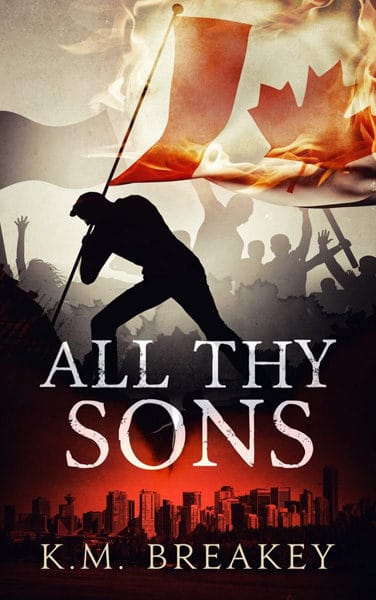The Great White North
Paul Kersey, American Renaissance, August 16, 2019
K.M. Breakey, All Thy Sons, Independently Published: 2019, 396 pages, $18.99 Paperback, $4.99 Kindle.
Michael Moore’s only fiction film is Canadian Bacon. “Bud Boomer” (played by the late John Candy) and his friends go to Canada for a hockey game. They are amazed by the country’s order and safety. They inadvertently start a riot, and an adviser to the US president sees it on the news. Desperate for a new “enemy” to justify the defense budget, the administration settles on Canada. However, a black adviser doubts the media can manufacture fear and hatred of Canadians because “they are whiter than us.”
In one scene, a CIA agent talks about Canada’s accomplishments: “Clean streets, no crime, no minorities!”
“How’d they do that?” asks the presidential adviser.
“No slavery!”
“Damn, they’re smart.”
The film came out in 1995. The jokes wouldn’t work now, because 25 years later, Canada is different. From 1996 to 2016, it went from 86 percent white to 72.9 percent white. Professor Ricardo Duchesne described the transformation of Vancouver in Faustian Man in a Multicultural Age, noting that the population with British ethnic origins declined from 75 percent in the 1950s to less than 36 percent by 2006. The city has been majority non-white since 2011.
Pollster Angus Reid noted a few years ago that “Vancouver is clearly an Asian Pacific city now.” University of British Columbia history professor Henry Yu likes that: “Vancouver is no longer a Canadian city; it is a global city that is one stop within the Pacific world.”
Toronto is also majority non-white. In 2019, its basketball team, the Raptors, won the NBA championship. Omer Aziz, an immigrant living in the city, wrote in the New York Times that it was a victory for diversity. “There were turbans and hijabs and the echoes of diverse accents” in the cheering crowed, he wrote. “Everyone was represented, and everyone was representing.” He suggested that the NBA championship let the city and the country “[find] its identity.” For him, this is “the future of the West.” The city fathers must agree. The motto on Toronto’s coat of arms is “Diversity Our Strength.”
Mr. Aziz neglected to mention the four people shot during the victory celebrations. Blacks commit a wildly disproportionate number of the shootings in Toronto.
K.M. Breakey’s All Thy Sons is a fictional treatment of the great replacement from a Canadian perspective. Like Jean Raspail’s The Camp of the Saints, it has real literary merit — and it is a thrilling read.

Anthony Fierro is the Canadian Virgil, guiding the reader through the hellish Vancouver of the future. “Tony” grew up in white, late-1970s East Vancouver, and noticed slow racial changes. Yet within a short time, few white children could be seen in public schools. Tony doesn’t do anything about what’s happening until a sudden catastrophe. Then he resists, but it’s too late.
By 2031, Canada is bleak, desperate, and has none of the social cohesion satirized in Canadian Bacon. “Not so long ago, people thought Canada was safe,” writes Mr. Breakey. “That was when sovereign nation-states were a thing and people of the Western World assumed civilization was the natural order. They believed it would go on forever.”
I suspect Tony is a stand-in for Mr. Breakey, and this book is his catharsis. At the end, Mr. Breakey speaks in his own voice: “People say the Canada I miss never existed, but I know differently. People had reason for optimism. Even white people.” He says his book may not save the West, but “at least I can document its demise.”
Documenting makes a difference. Artists such as Mr. Breakey are an important part of our movement. White advocates aren’t trying to foist a plot on our people. We’re just looking back to a normal time when it was OK to be white and live in a mostly white country.
At one time, Canadians had a real identity that didn’t depend on winning a basketball game. Simply reminding people of our past reinforces that identity. It rallies activists. If enough of us unite, we can avoid the dystopia Mr. Breakey describes so well.















